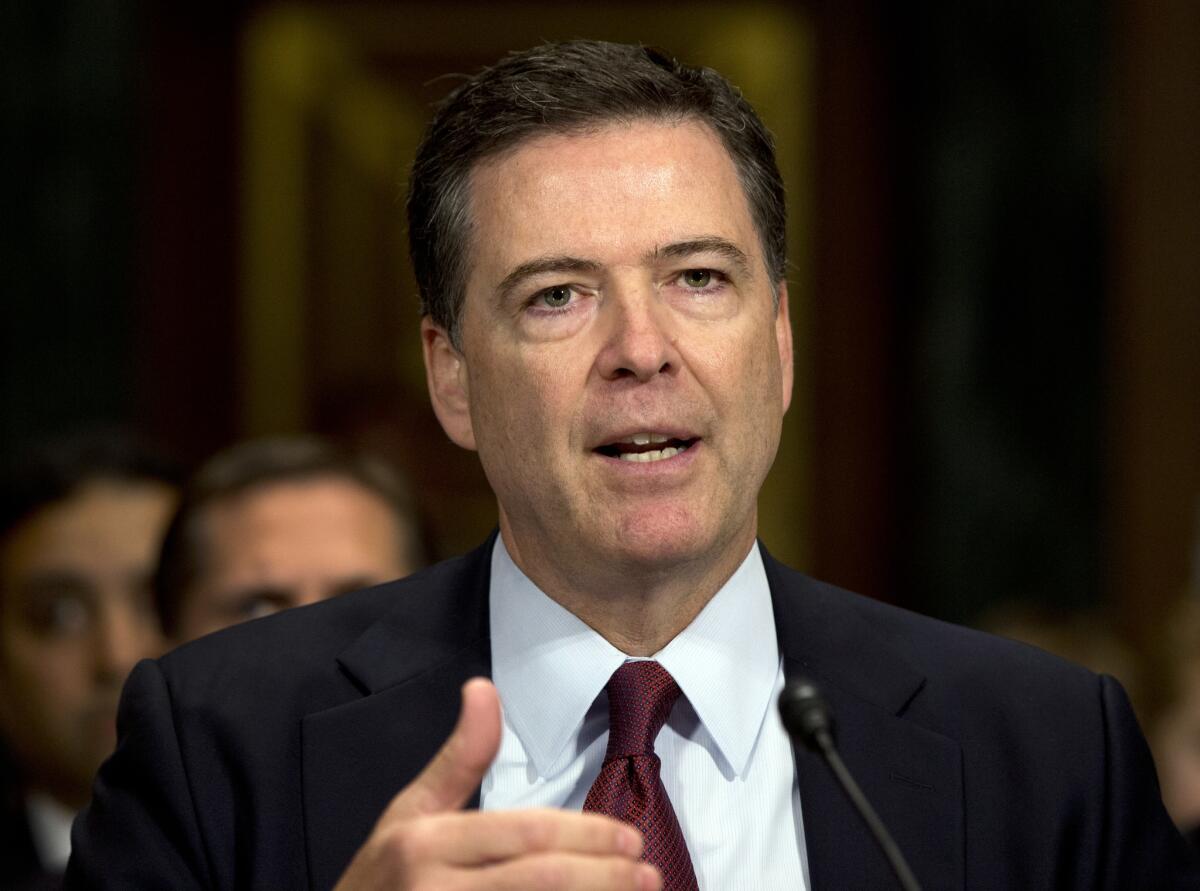FBI chief says agents thwarted possible July 4 terror attacks

FBI Director James Comey, seen here Wednesday, says the FBI stopped several potential acts of violence in the month before the Fourth of July weekend.
- Share via
Reporting from Washington — More than 10 people inspired by Islamic State militants were arrested in suspected terrorism-related plots during the four to six weeks leading up to the Fourth of July holiday, FBI Director James Comey said Thursday.
“I do believe that our work disrupted efforts to kill people, likely in connection with July 4th,” Comey said in a briefing session with reporters at FBI Headquarters.
Comey said the arrests underscored Islamic State’s ability to use the Internet in “recruiting, directing and motivating” people to carry out terrorist attacks in the United States.
Comey did not identify or provide details about the people arrested and he acknowledged that it was unclear whether any would have struck during the holiday. But, he said, “some of them were focusing on the Fourth of July.”
In the weeks before the three-day weekend, the FBI and the Department of Homeland Security issued a bulletin to police agencies around the country alerting them of the increased terrorism threat. Comey said that gave authorities time to make arrests before any terrorism plots could be carried out.
He noted the June 2 attack by Usaama Rahim, a 26-year-old Muslim who was shot and killed in Boston while threatening others with a knife. Rahim had been under surveillance by five FBI and agents and one Boston police officer, all part of a Joint Terrorism Task Force there.
“Rahim in Boston, I believe, was bent on doing something in the future,” Comey said, “and woke up on the morning of June the 2nd and said, ‘You know what, I think today is the day,’ and just went out to try and kill people.”
Comey said Islamic State, also known as ISIS and ISIL, has far surpassed Al Qaeda as a main terrorism threat to the U.S. both at home and abroad. He referred to Al Qaeda as “your grandfather’s” terrorist organization and noted that it would spend months and sometimes years plotting and funding attacks.
Islamic State, however, identifies and reaches new recruits quickly through the Internet, and works to inspire them to launch attacks. He said the bureau has found Islamic State leaders communicating with potential recruits in all 50 states.
The FBI director said Islamic State is much more Web savvy, and often steers recruits to encrypted email and text communications that law enforcement cannot access.
On Wednesday, Comey testified at two Senate committee hearings about the need for federal legislation to allow law enforcement to get around encrypted messages, and on Thursday he said he hoped that companies like Apple, Google and Twitter will eventually permit it.
Without it, he said, it is nearly impossible for law enforcement officials to track suspected terrorists when they “go dark” on the Web. He said the FBI has been tracking dozens of suspects who suddenly switched to secure messaging apps, frustrating the FBI’s ability to follow their conversations.
“It may well take a legislative fix” to grant law enforcement that access, he said. “But I don’t know what that is yet.”
On Twitter: @RickSerranoLAT
More to Read
Sign up for Essential California
The most important California stories and recommendations in your inbox every morning.
You may occasionally receive promotional content from the Los Angeles Times.














